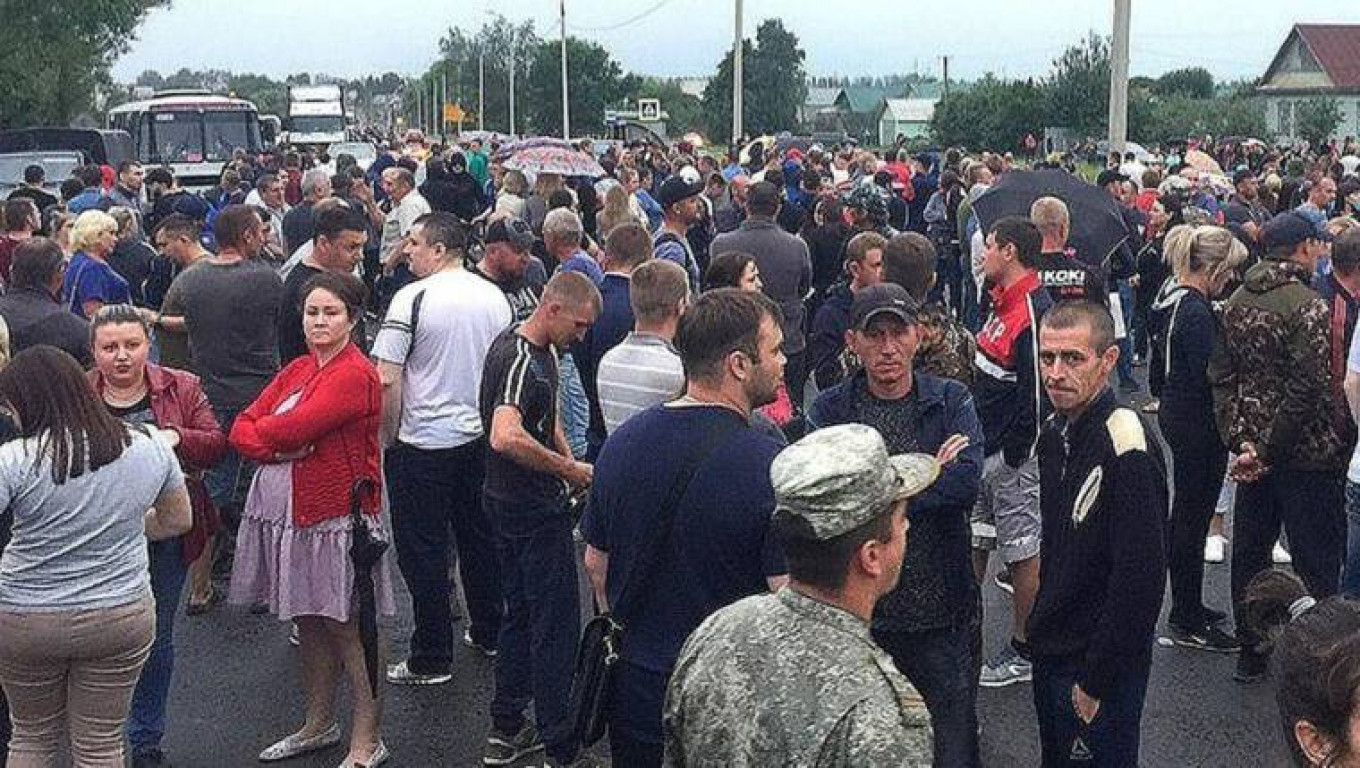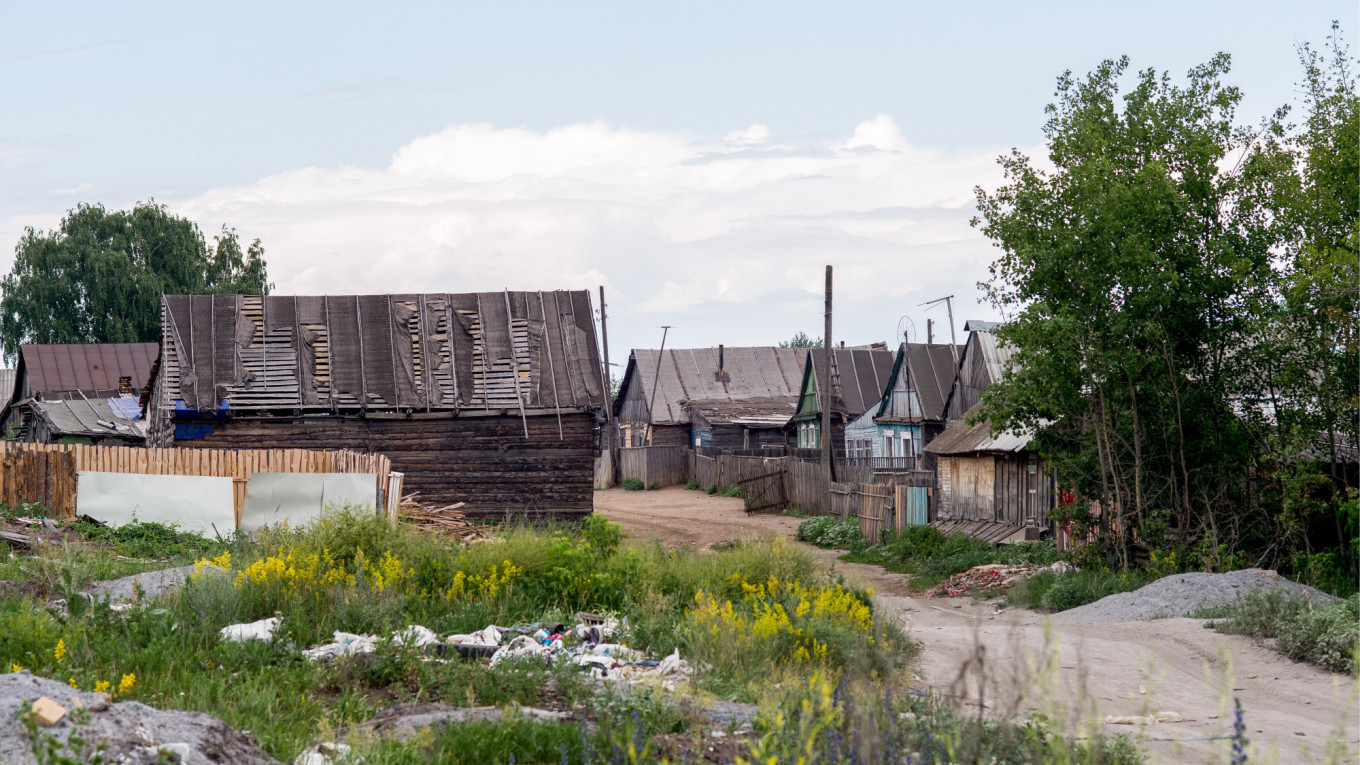Dmitry, his wife, their five children and his elderly mother spent last weekend hiding in the woods just outside Penza, a city 650 kilometers southeast of Moscow. Whenever they needed food or water, Dmitry drove to the nearest store, bought rations and, after briefly charging his phone, hurried back to his family.
“I didn’t sleep the entire time. We wore the same clothes we left in, and I now have 500 rubles ($7.81) left in my pocket,” Dmitry, 35, said by phone on Wednesday afternoon from the neighboring region of Ulyanovsk, where the family is now staying with relatives. “I won’t take my family home until there is no longer a threat to our lives,” he added, noting he had thought the danger would subside sooner. “But all I want to do is go home.”
Dmitry (whose name has been changed) is one of the Roma minority who live in Chemodanovka and Lopatka, neighboring villages in the Penza region. Last Thursday, a mass brawl in Chemodanovka between Roma and Russians over claims Roma boys were trying to sexually harass Russian girls resulted in the death of one Russian and left another in a coma and three others in hospital.
The case is the latest in a recent spate of ethnic flare-ups across Russia that witnesses have compared to anti-Jewish pogroms at the turn of the twentieth century. This is the second time since the eve of Vladimir Putin’s inauguration last May as Russia's president for a fourth term that violence has broken out between ethnic Russians and Russia’s Roma minority. And it’s the second time this year that a huge public fight has erupted over accusations a member of a minority group has sexually harassed a member of the local majority.

It is not entirely clear what caused the Chemodanovka conflict. Penza region governor Ivan Belozertsev on Wednesday called it a “domestic conflict” between Russians and Roma people, although he had initially blamed the United States and the West for “destabilizing the situation.”
In recent days local Russians have told journalists that the brawl started after about 15 unarmed Russian men went to speak with the Roma community last Thursday evening following claims that two Roma boys had sexually harassed two Russian girls earlier in the day by a local creek. The Russians said the Roma did not want to talk, and that around 100 others suddenly showed up with bats, axes and knives, and stabbed a Russian to death.
Dmitry said he was aware of that version of events, but that he believes the woman who complained her daughters were being sexually harassed was exaggerating because she “has long had problems” with the Roma minority. While Dmitry was at home when the conflict broke out, he also said that, as far as he understood, the Russians who had shown up to talk were drunk and had instigated the fight with the Roma, who were attempting to defend themselves.
Nadezhda Demeter, a senior Roma official, likewise put the blame on ethnic Russians in a radio interview over the weekend. When reached by phone, she declined to comment.
In the conflict’s aftermath, the Chemodamovka and Lopatka Roma people left behind 90 empty homes, along with contradicting claims as to how they departed. Speaking to a local gathering on Monday, the Russian head of the village council Sergei Fadeyev said that about 900 Roma people had been removed forcibly and taken by bus to the Volgograd region to the south. He retracted those comments a few hours later.
Fadeyev could not be reached for comment. A woman who picked up the phone at the village council offices told The Moscow Times that the council did not have Fadeyev’s contact information before hanging up. The Penza governor’s spokesperson said an estimated 650 Roma had left voluntarily. Dmitry called Fadeyev’s initial comments “lies,” saying that the Roma had fled rather than having been escorted out by the authorities.
“We would have known if this was true,” he said, noting he is in touch with other Roma people who have left. “The Russians warned one of our elders on Friday that they would come back that evening and kill all of our men. In that way we were forced to leave.”
After the brawl, an estimated 1,500 people blocked a federal highway to demand protection from the regional government. Videos later circulated showing abandoned Roma homes set on fire.
Olga Abramenko, an expert on the Roma with the St. Petersburg-based Memorial Anti-Discrimination Center, said that tensions between Roma people and ethnic Russians are long-standing and flare up occasionally. Last year, the independent Levada Center pollster found that xenophobia in Russia was growing, and that the largest portion of it was directed toward the Roma. Of those polled, 43 percent said they wouldn’t let Roma people into the country.
Since a law was passed in 1956 banning the Roma’s nomadic lifestyle, they have had trouble integrating into Russian society, Abramenko said. While a recent census numbered Roma in Russia at some 200,000, Abramenko said the actual figures range between 400,000-500,000, because many are scared to identify as Roma and because the government didn’t allocate land to all of them after 1956. As a result, Roma people built houses without proper land ownership documents and, as a consequence, many aren’t registered.
This state of affairs also makes it difficult for Roma to attend school. And even if they are able to, they often face discrimination and drop out early. In 2017, Memorial specifically included the local school for Chemodanovka and Lopatka in a report to the United Nations Committee on the Elimination of Racial Discrimination. At the time, the school had separate classes for Roma.
“We have real apartheid with Roma people in Russian schools,” Abramenko said. “Because of this, parents take kids out of school early, thinking, ‘What’s the point?’ So the kids are handed the traditional Roma fate — early pregnancies and poverty. This cycle needs to be broken, but the authorities don’t care and deal with the problem in the language of repression.”
She highlighted an October 2018 Kremlin round table on a government drive to evict dozens of Roma from the Tula region south of Moscow. “You and I both know well that they professionally deal drugs there and people just don’t want to live near that — that’s the problem,” Putin told Demeter during the discussion.
“When you hear that from a regular person, you can let it slide,” Abramenko said. “But from the president?”
As an example of a commonly propagated scare story, she noted that Russian parents sometimes tell their children that “gypsies” will kidnap them if they misbehave. Dmitry also referenced the folktale as prevalent in Penza.
Days before Putin’s inauguration last year, a similar conflict to the one in Chemodanovka took place in the Ust-Abakan settlement in the remote Siberian Republic of Khakassia. During an argument that turned into a fight between a Roma person and an ethnic Russian, the Russian fell backward and hit his head, resulting in his death.
Almost immediately, around 500 local Roma fled because of threats from Russians, leaving their homes behind to be ransacked. Sergei Mikheyev, a colleague of Abramenko’s at Memorial, wrote after a visit to the settlement last summer that what he saw reminded him of pictures of the Jewish pogroms of the last century.
By September, some of the families who had left had begun to return, but local officials said 11 of their homes would be razed. The families sued, with the local court ruling in their favor. But after officials appealed, Khakassia’s Supreme Court stood with officials in a decision at the end of May. The families’ lawyer Valery Zaytsev told The Moscow Times that they will have 30 days to vacate their homes once officials announce eviction proceedings in the coming days.
“We are Russian citizens. We have lived here for 20 years,” Evgeny Goman, a 36-year-old Roma facing eviction said in a phone interview. “Why do we all have to go? The perpetrator should be punished, yes, but why does an entire people need to be punished for an individual’s crimes?”
Alexander Verkhovsky, the director of the Moscow-based SOVA Center, which tracks extremism, said that throughout the aughts and into the early 2010s local officials regularly moved entire groups of Roma across regions after demands from ethnic Russians, often openly agreeing to the action with the leaders of Roma groups. But because this practice is illegal, officials have started looking for workarounds, Verkhovsky said.
“Official policy is to side with the majority group,” he said.
Verkhovsky said the same thinking was involved when the Siberian region of Yakutsk banned migrant workers in March following mass protests that kicked off after locals blamed a rape on a Kyrgyz migrant.
And similar thinking may now be at play in Chemodanovka and Lopatka. Russians have told reporters they fear for their lives if the Roma return. Officials said they have arrested 28 people in the aftermath of the brawl, all Roma. And Fadeyev, the local official who later retracted his comments, told a Novaya Gazeta journalist Monday that “now we are studying the legality of their living in our village.”
Verkhovsky, however, warns against drawing conclusions about the recent spate of ethnic conflict as a broader trend just yet. He noted that, in 2013, after a series of advertisements against migrant workers, attacks on migrants spiked. The following year, though, the attacks subsided.
Yet for those that lived through last week’s conflict, a strong impression has been made.
In a phone interview, local pastor Sergei Kireyev, who is Russian, said over the past two years he had welcomed 50 Roma people into his church and was trying to help them better integrate into the community. He said that after the brawl he had never seen people “so scared for their lives,” and so he made two trips to the Voronezh region more than 500 kilometers to the southwest to help evacuate the Roma to their relatives there. During one trip, his Toyota Corolla was filled with 11 people.
“The one thousand people that came out, they weren’t just tired of Roma people, they were tired of a lot of things,” Kireyev said. “Life today isn’t easy and I think this conflict is like the pre-revolutionary pogroms when people attacked Jews in the same way. I think people are angry and have found a minority to blame.”
“But will their lives get better? Will they be happier? Will they have more jobs?” Kireyev added. “No.”
A Message from The Moscow Times:
Dear readers,
We are facing unprecedented challenges. Russia's Prosecutor General's Office has designated The Moscow Times as an "undesirable" organization, criminalizing our work and putting our staff at risk of prosecution. This follows our earlier unjust labeling as a "foreign agent."
These actions are direct attempts to silence independent journalism in Russia. The authorities claim our work "discredits the decisions of the Russian leadership." We see things differently: we strive to provide accurate, unbiased reporting on Russia.
We, the journalists of The Moscow Times, refuse to be silenced. But to continue our work, we need your help.
Your support, no matter how small, makes a world of difference. If you can, please support us monthly starting from just $2. It's quick to set up, and every contribution makes a significant impact.
By supporting The Moscow Times, you're defending open, independent journalism in the face of repression. Thank you for standing with us.
Remind me later.







